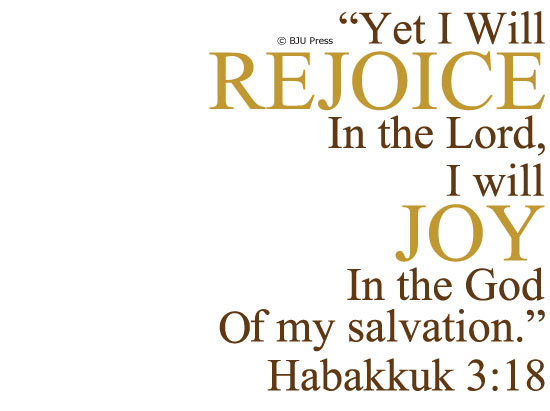“Although the fig tree shall not blossom, neither shall fruit be in the vines; the labour of the olive shall fail, and the fields shall yield no meat; the flock shall be cut off from the fold, and there shall be no herd in the stalls.” (Habakkuk 3:17)
Taken alone, this passage would appear to be nothing more than a sad lament because we see a list of scarcities. But it takes a different tone in verse 18, to end on an immensely uplifting note. Its determined author concludes—“Yet I will rejoice in the Lord, I will joy in the God of my salvation.”

Through the ages, untold millions have drawn comfort from these verses, regarding them as the undying melody in the patient sufferer’s heart. They remind us that although temporal blessings may ebb and flow, our rejoicing need not. Our thanksgiving—rooted in the past, the present, and the future—is truly eternal.
We can trace the Lord’s mercies to us long before our birth. Just thinking of all the variables involved in assuring that climactic moment overwhelms the mind. Considering the simple fact that we arrived, and then recalling the myriad blessings we have received since, makes our memories treasures that can never be taken from us. We often think of this as one of the great compensations of old age. Where the cache of blessings has swollen to a great store, even the weary can say with the psalmist, “I have been young, and now am old; yet have I not seen the righteous forsaken” (Psalm 37:25). But because all of us have been blessed from birth, our gratitude can begin from the moment we first comprehend God’s goodness.
In the present, we see the blessings of God continually bestowed. His Spirit enables us to meditate on His word and our saving grace in Christ. This strengthens us in the inner man and makes our sensitivity to His daily favor increasingly acute. Even the beleaguered and weeping prophet was able to say “It is of the Lord’s mercies that we are not consumed, because his compassions fail not. They are new every morning: great is thy faithfulness” (Lamentations 3:22–23). This work of God’s Spirit assures the survival of Christian faith and is an ever-present cause for thanksgiving, no matter what befalls us day by day.
The lovely Psalm 23 is a litany of blessings in the psalmist’s “present.” David’s grateful acknowledgement throughout pays a rich dividend of assurance at its soaring crescendo. As he looks into the future with a heart overflowing with thanksgiving and confident trust, he exclaims, “Surely goodness and mercy shall follow me all the days of my life: and I will dwell in the house of the Lord for ever.” Perhaps meditating on the past, and present, fed David’s hopefulness for the future?
Steadfast praise for past, present, and future blessings draws the believer close to the heart of his heavenly Father. As he walks in fellowship with God, his gratitude remains lively even when tangible blessings seem few. His memory of past mercies, his experiences of current graces, and his focus on God’s promises for his future all play a part in the soul-cheering exercise of his eternal thanksgiving.
May you be encouraged this Thanksgiving to reflect on past, present, and future blessings.
Leave a Reply